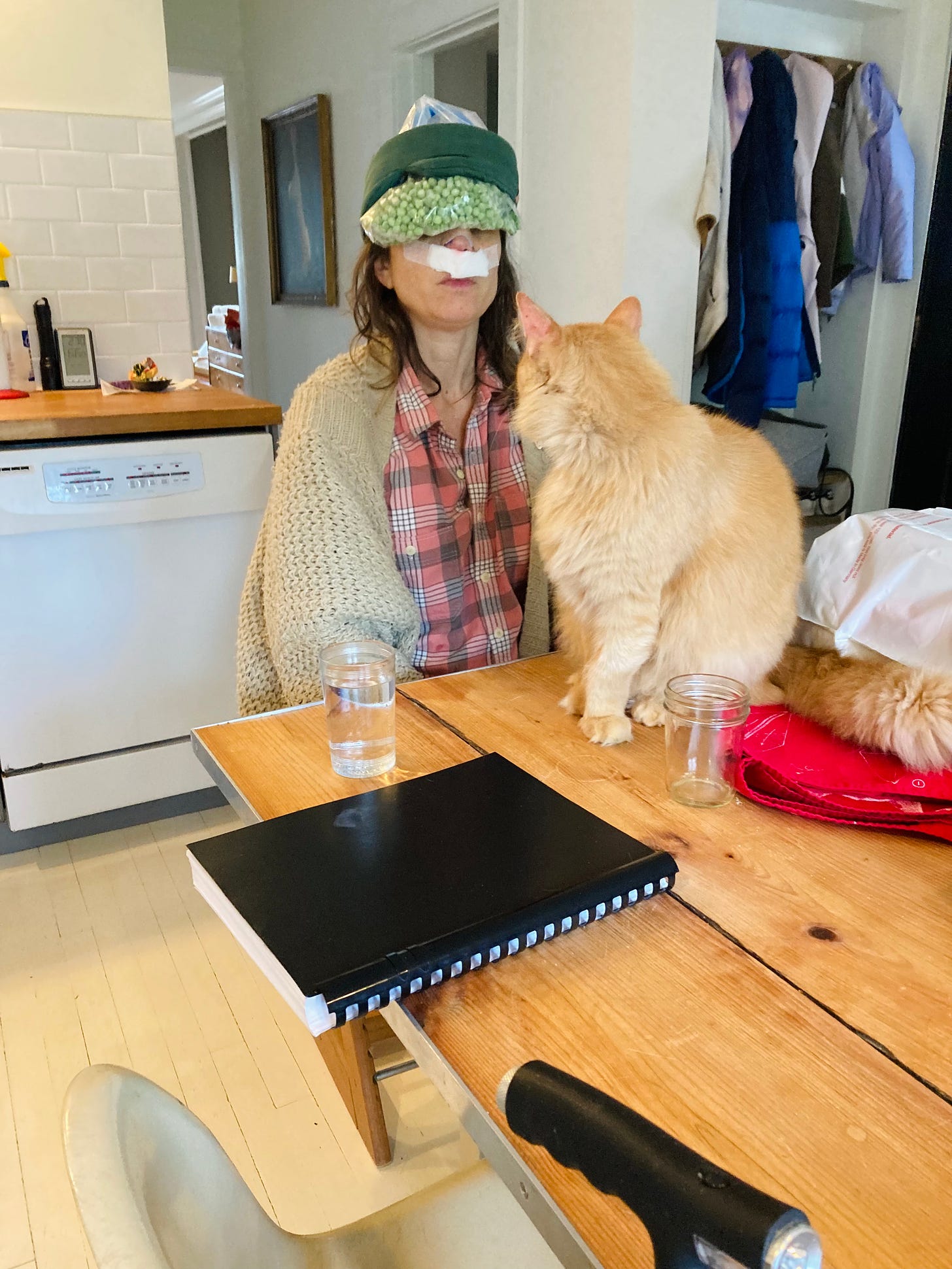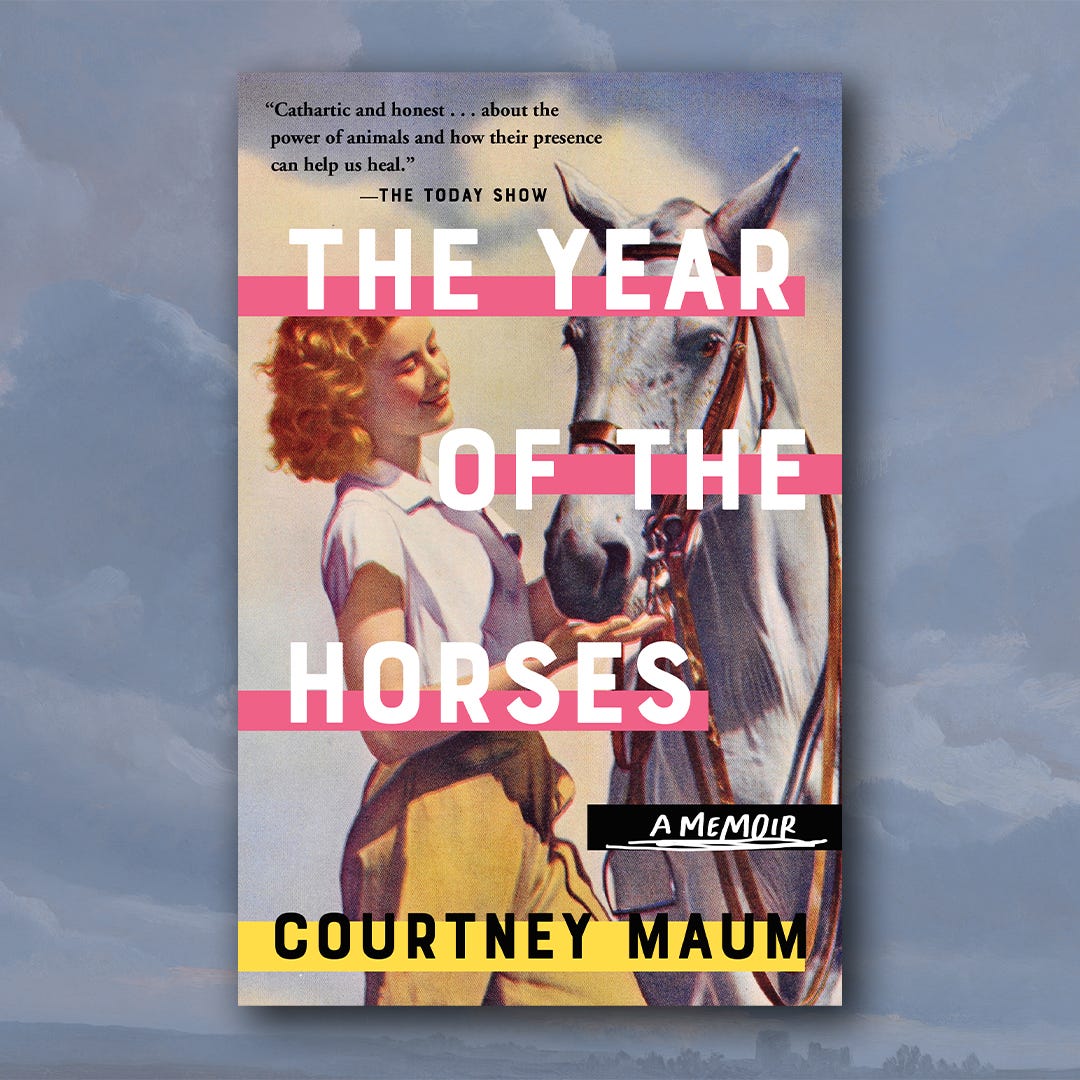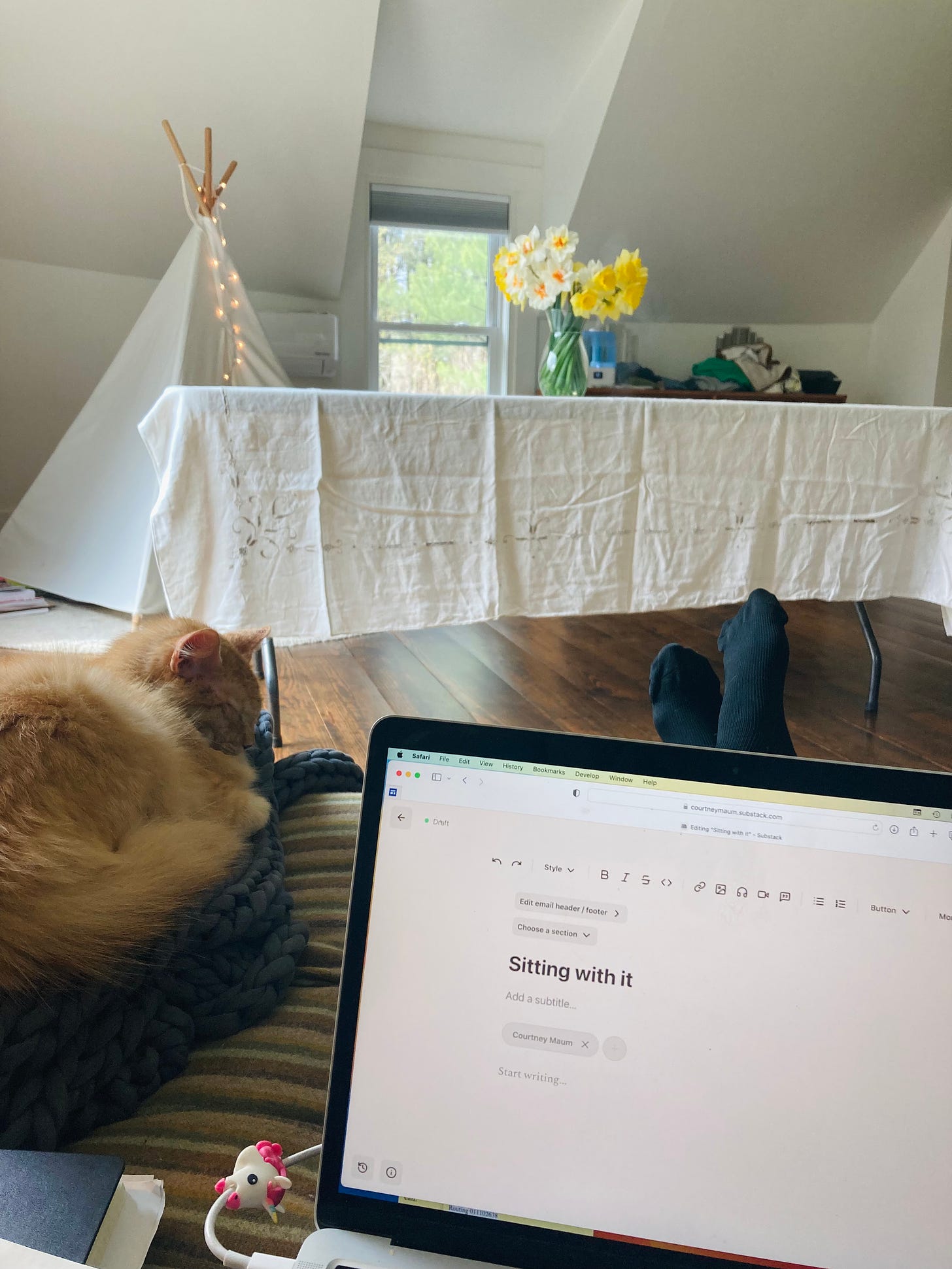Dear friends,
As I write this, I’m not strong enough to reach the top nook of my book shelf where I keep miscellanea from my preK-12 life, but if I could open the box I store there, I’d find a clump of old report cards that—regardless of the subject they’re reporting on—all say the same thing:
“Courtney has a predilection for such and such a subject, but she rushes through her work.”
“She sometimes seems more focused on the outcome than the process.”
“Courtney needs to slow down, learn to take her time, and enjoy taking that time.”
The printed report cards I used to receive from the Mr. Schwartzs and Mrs. Vasus of my childhood have been replaced by “big picture thoughts” from my literary agent, line notes from my editors, book reviews of my own books. When it comes to the published version of my work, whether it’s an essay, a novel, or even a Substack post, I spend time; I give thought; I take pride in putting out a thoughtful, finished product. On that front, I’ve made progress. What I haven’t gotten better at is slowing my internal clock. Even though I’ve been gifted with evidence that the world will keep on turning if I don’t publish a book every two years, I myself am not convinced that I will personally hold together if I don’t stay ultra productive, because I associate productivity with my own self worth. (For more on this negative equation, you can either read my memoir or call my therapist.)
Accordingly, I’m not surprised to see I’ve saddled myself with the pressure to recover from nasal surgery faster and better and more wittily than I was told I could. But it is surprising—to me at least—that I’m failing on that front.

As I’ve written about previously, I had an appointment with an Ear, Nose and Throat doctor this winter where he diagnosed extreme breathing problems that made me a candidate for nasal surgery. I got a second opinion, and that doctor agreed that surgery could be life-changing, and possibly mitigate the insomnia that has plagued me most of my life. In the pre-op paperwork the surgical center supplied me with, the doctors said to clear my schedule for two weeks: that I should plan on doing nothing and focus exclusively on rest.
Last Tuesday, I went under the knife: getting a turbinate reduction, a septoplasty and a nasal valve repair in one go. The afternoon of my surgery, I did not follow the instructions I was given: I did not do nothing. In fact, I did too much. My surgery unfortunately coincided with a week my husband was out of the country for work, and so, not knowing what else to do (or how to get my daughter back and forth to school) I flew my mother out from Florida to help me in his absence. The problem is that my mother has mobility issues. While she was helpful with the school commute, in the house where I was healing, I had to help her with daily ministrations instead of the reverse.
The afternoon of my surgery, instead of doing nothing, I did laundry, cooked dinner, helped my mom unpack, tidied the kitchen a bit, put my daughter to bed. “I’ve got this,” I thought, reflecting on the day’s unfolding. “I’m earning an A!”
Around eleven that night, the anesthesia I’d been pumped with left my body, replacing the euphoria that had buoyed me through the afternoon with a bottom-of-the-barrel knowledge that I had done too much, gone too far, set back my recovery. I had been told to do nothing. But per my usual, I rushed through doing nothing straight to doing far too much.
I’m writing this one week after my surgery, and the truth is I should not be writing on a computer, or writing anywhere at all. But I want to remember the things I’m realizing about my psychological resistance to stillness and relaxation so I can hold myself accountable around this in the future, and perhaps help people who are also obsessed with productivity to a negative degree.
In the days after my surgery, I suffered greatly for overdoing it. Yesterday, I was so weak I couldn’t take the plastic cap off the thermometer to check my temperature. A friend came by with homemade bone broth and I burst into tears from gratitude, which is not a reaction recommended by my surgeon: along with sneezing, laughing and coughing, crying puts too much stress on the stents stitched in my nose. In the week that I’ve sat here in a sleeping bag on my couch with an ice pack on my face and compression socks pulled high, I’ve felt cortisol running through me instead of relaxation. I haven’t napped once; my shoulders are scrunched with stress—if it didn’t hurt to do so, my jaw would be tightly clenched. Concerns about when I can get back to work in a meaningful way taunt me. “Look how far behind you’re falling!” I keep saying to myself. “I’ll never get my book done, I’m going to be playing catch up all summer,” is a mantra that soon morphed into: “I am going to fail.”
About the book in question: I’ve been trying to perfect a novel manuscript for two years now. It’s taken on numerous iterations since I started and even changed genres from literary mystery to rom com to literary satire. I’ve been on the right path (satire) for the last year, and made arrangements with my agent to get her 40% of the novel before my surgery for her review. But in preparing the material, I realized I’d gone off the rails from chapter 14 on. The hard thing about novel writing is that you have a zillion paths to choose from in terms of character arcs and plot. Because I’d course-corrected both these in a recent revision, I didn’t realize that—in that same revision— I’d added a new path from chapter 14 on that threw everything off course until I started preparing the material to share with my agent. The manuscript wasn’t shareable, is what I realized, staring at my print out. It needed to be rewritten. Or rather, it needed to be rewritten again. I’ve rewritten the first half of this book so many times now, it’s beginning to feel like a compulsion, an obsession, and a point of shame. I keep saying to myself, “you have five published books behind you, how is it possible that you’re getting this so wrong?”
“It’s inexcusable that this is taking you so long,” is something else I say.1
But you know what? The novel that I’m working on isn’t under contract. You think my agent is the one who asked me to get the manuscript to her the day before my surgery? Of course not—I set that deadline myself. I wanted to have the entire thing finished and ready to submit to editors this summer. Why? Because that’s another deadline I created for myself. I don’t need money to research this book. I’m not going to starve in the next year if I don’t sell it. Every indicator in the universe is telling me that this book needs time, more time than my other books needed. Why? There is no reason. It just does. Writing books takes time. But I am categorically—even psychosomatically—uncomfortable with giving this book time, just like I’m not giving myself time to recover on my couch. I feel urgently about everything; hurried and insistent. I am my own worst enemy in this way, but I’m also my own champion. Nobody else is driving me toward the finishing line but myself.
I’m under too many painkillers to pull a takeaway from what I’m sharing here. I suppose I want to say that I know there are a lot of you who also feel desperate and rushed and urgent about the things you’re trying to make happen. There are a lot of you who think that when you take the time and energy to sit down and to write well, that you should get that writing perfect out the gate. But this writing thing takes time—so much time; time that feels expensive—and it takes a level of patience that is nearly saintly that I don’t yet possess myself. I think my difficult post-op recovery is going to change my relationship to patience, which—as much as I don’t want to admit it—is a good and necessary thing.
The table of the future…plus, an orange cat.
From my couch, I see a folding table I asked my husband to install. I covered it with a tablecloth and daffodils a friend brought over. When I’m feeling stronger, I’m going to lay out the least interesting pages of my novel on this table and work slowly—very slowly—to understand why these pages are dull and dragging, to understand where to put more energy and heat. The installation of this table was inspired by something author Marie-Helene Bertino said in our filmed conversation from last week, that in revision, she takes out the worst sections of her novels and works them over and over until they become her favorite sections of her book.
That is not going to be an easy activity for me, nor will it be a quick one. This level of slow and deep revision is going to see me miss my self-imposed deadlines. But slow and deep attention is what the book needs, and I know in my belly that when I get this book right, it will be worth the grit that I put into it, and that I will be proud of myself, and also proud of my agent who isn’t allowing me to phone anything in.
There is a parable I heard once about a man who went to the home of a famous cook to eat a soup known the world over as being the best soup in the world. He arrives hungry. He waits hours. Nothing is served to him. The man waits at the table into the next morning. The morning becomes the afternoon. The man yells at the chef, cries, begs, screams—the chef keeps on saying that the dish just isn’t ready. On the third day, the chef brings the soup out, and it is the most exquisite, life-giving meal the man has ever had. “What is the secret ingredient?” the man asks, savoring the soup slowly. “You have to tell me! It’s the best thing I’ve ever tasted.” The chef laughs. The secret ingredient, the chef says, is simply: time.
If you too struggle with perfectionism and an equation of productivity with self-worth, consider picking up my memoir THE YEAR OF THE HORSES which explores these topics at length and attempts to reckon with them. “The Today Show” picked it as their top read for Mental Health Awareness and Amazon chose it as one of the best memoirs of 2022. I’m proud of this book!

Let it be said that I am a solid cheerleader to others, and a terrible cheerleader for myself.





Courtney Maum, I’m a serious fan — please hear two things from me:
1. Throw out those old report cards and notes from ancient history. For real, no lie: fuhgedaboud it!
2. We have all the time in the world to get your next book. We’ll be here, not anxiously waiting, but lovingly waiting.
Ok, three things:
3. Bless yourself with one more solid week to recover. You deserve it.
I struggle with this rush and pressure as well, especially during my last pregnancy. Here’s to letting things grow at their own pace! And I hope you feel much better soon.